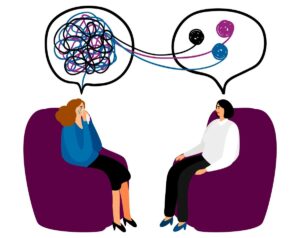Bipolar disorder is a mood disorder that causes extreme shifts in mood, energy, and activity levels. When left untreated, bipolar disorder can severely impact the quality of life of those who suffer from it. Fortunately, there are treatments available to help manage symptoms and reduce the negative effects of bipolar disorder. In this blog post, we’ll explore the benefits of talk therapy for treating bipolar disorder and how it can help those living with this condition.
Contents
What is Bipolar Disorder?

Bipolar disorder is a mental illness that causes extreme mood swings. The highs, or mania, can last for weeks or even months. During this time, people with bipolar disorder may have lots of energy and be very productive. They may also take risks and make impulsive decisions. The lows, or depression, can last for weeks or longer. People with bipolar disorder may feel sad and hopeless during this time. They may lose interest in activities they once enjoyed and have trouble concentrating.
The origin of bipolar disorder is unknown, but it is believed to be a combination of genetic, biological, and environmental factors. Treatment typically involves medication and psychotherapy. There are several types of talk therapy (also known as psychotherapy) that can help those with bipolar disorder manage their symptoms.
The Different Types of Talk Therapy
There are different types of talk therapy, each with its focus and goals. The most common types of talk therapy are:
Cognitive Behavioral Therapy

Cognitive behavioral therapy (CBT) is a type of talk therapy that can be used to treat bipolar disorder. CBT can help you learn to manage your thoughts, emotions, and behaviors. It can also help you identify and change negative thinking patterns. CBT is usually provided by a licensed therapist in individual or group sessions.
During CBT, you will work with your therapist to identify your negative thinking patterns. Once these patterns are identified, you and your therapist will work together to find more positive and productive ways of thinking. You may also be asked to keep a mood diary to track your thoughts, emotions, and behaviors over time. This can help you and your therapist see patterns in your behavior and identify triggers for your symptoms.
CBT can be an effective treatment for bipolar disorder. It can help you learn how to manage your symptoms and reduce the risk of future episodes.
Dialectical Behavioral Therapy
One of the most common forms of therapy used to treat mental health disorders is Dialectical Behavioral Therapy (DBT). DBT combines cognitive-behavioral techniques with mindfulness and acceptance strategies. The goal is to help individuals improve their ability to manage difficult emotions, reduce conflict in relationships, and develop healthier patterns of thinking and behaving.
In DBT, individuals learn how to accept and change their thoughts, feelings, and behaviors to improve their quality of life. Through this process, they are also encouraged to become more aware of the world around them and recognize that their thoughts, feelings, and behaviors are interconnected.
Humanistic Therapy

Another type of psychological therapy is humanistic therapy. This type of therapy focuses on helping individuals take responsibility for their own choices and actions, and to recognize the importance of their own needs about those of others. Humanistic therapists believe that each person has the capacity for self-actualization, or the ability to reach her fullest potential. They emphasize respect for the individual, personal growth, and self-actualization.
Humanistic therapists also use a variety of techniques to help individuals reach their goals. These include empathy – an understanding of the client’s experience; non-judgmental acceptance of the client; and reflective listening – active listening in which the therapist restates what the client says to ensure understanding. Other techniques used may include role-playing, art therapy, and journaling.
Psychodynamic Therapy
Another type of therapy is psychodynamic therapy. This approach focuses on exploring the unconscious processes that may be influencing a person’s thoughts, feelings, and behaviors. It helps to identify any unresolved conflicts from childhood or other past experiences and allows them to come to light for the individual to develop new ways of understanding and managing their emotions, thoughts, and relationships.
The psychodynamic approach is based on the belief that our past experiences and relationships can have a significant impact on how we think, feel, and behave in current situations. This type of therapy encourages patients to explore the underlying motives for their behavior by looking at early childhood events and family dynamics.
Holistic Therapy

Another popular form of therapy is a holistic therapy. Holistic therapy is used to treat a variety of mental health issues by taking into consideration the physical, psychological, social, and spiritual aspects of an individual’s life.
This type of therapy often includes relaxation techniques such as yoga or meditation and lifestyle changes such as improved nutrition and exercise regimes. In addition to addressing current mental health issues, holistic therapy is used to help individuals find overall balance and peace in their lives.
This type of therapy may be used in conjunction with other forms of treatment or on its own. Holistic therapy can provide a powerful way for individuals to gain control over their mental health and well-being.
How Does Talk Therapy Help With Bipolar Disorder?
It is no secret that bipolar disorder can be a very difficult illness to manage. The highs and lows of the condition can make it hard to maintain healthy relationships, keep a job, or even stick to a treatment plan. That’s where talk therapy comes in.
Talk therapy, also known as psychotherapy or counseling, involves talking with a mental health professional about your thoughts, feelings, and experiences. Many people who have bipolar disorder find talk therapy to help manage their symptoms and improve their quality of life.
Here are some ways that talk therapy can help with bipolar disorder:
- Talk therapy can help you understand your condition better.
If you have never been diagnosed with bipolar disorder, receiving a diagnosis can be confusing and overwhelming. Talking with a therapist can help you make sense of your diagnosis and learn more about what it means for your life going forward.
- Talk therapy can help you develop healthy coping skills.
Bipolar disorder can be very stressful, both for the person living with the condition and for their loved ones. Learning healthy coping skills (such as how to manage stress, set boundaries, and communicate effectively) can go a long way in reducing stress levels and improving communication within relationships.
- Talk therapy can help you build a support system.
Having supportive family and friends is important for everyone, but it is especially important for those living with bipolar disorder. A mental health professional can help you identify people in your life who can provide a listening ear, guidance, and emotional support.
- Talk therapy can help you identify triggers for episodes.
Bipolar disorder is often characterized by episodes of mania and depression which can be unpredictable. Through talk therapy, you can learn to recognize early warning signs of an episode and develop strategies for managing it before it gets out of control.
- Talk therapy can help you create a treatment plan that works for you.
Developing an effective treatment plan is essential for managing bipolar disorder. A mental health professional can work with you to create a plan that incorporates lifestyle changes, medication (if necessary), and other interventions that are tailored specifically to your needs.
What To Expect From Talk Therapy?

When you first start talk therapy, the therapist will likely ask you about your symptoms, thoughts, and feelings. They may also ask about your family history and any other important information. Once they have a good understanding of your situation, they will work with you to set goals for treatment.
Talk therapy usually involves weekly sessions where you and the therapist talk about your progress and challenges. You may also discuss topics such as coping with stress, managing symptoms and making lifestyle changes. The therapist can provide support and guidance. It is up to you to make the changes that will improve your bipolar disorder.
The expectations also depend on the type of talk therapy you are receiving. Cognitive-behavioral therapy (CBT) is a common form of psychotherapy and sets specific goals, such as recognizing and changing thought patterns and behaviors that contribute to your symptoms. Interpersonal therapy (IPT) is another type of talk therapy geared towards resolving interpersonal issues that may be contributing to your symptoms.
There is no one-size-fits-all approach to talk therapy, so it is important to discuss your expectations with your therapist before beginning treatment.
How To Find a Therapist?
When looking for a therapist, it is important to find someone who is a good fit for you. There are many different types of therapists, and each one has its approach. It is important to find a therapist who specializes in treating bipolar disorder.
You can ask your doctor for referrals, or search online for therapists in your area. You can also read reviews of therapists to get an idea of what others have experienced. Once you have found a few potential therapists, you can contact them and ask questions about their experience and approach.
Finding a therapist can be a difficult process, but it is worth the effort. It will help you find a therapist who understands your needs and can provide you with the best possible care.
It is also important to make sure that you feel comfortable with the therapist. You should feel like you can trust them and that they understand your situation. If you don’t feel comfortable with the therapist, it may not be the right fit for you.
Conclusion
Talk therapy for bipolar disorder can be an effective form of treatment when it’s coupled with medication. Therapists specializing in this type of therapy are skilled at helping people explore their emotions, understand the underlying causes of their condition, and make changes that will help them manage their symptoms better.
Talk therapy is most successful when done regularly and consistently. This is so that individuals have the support they need to stay on track. With the right care team and dedication to managing one’s mental health, talk therapy can improve the quality of life for those with bipolar disorder.
For more information, please contact MantraCare. Bipolar disorder is a mental illness characterized by extreme shifts in mood, energy, and activity levels. If you have any queries regarding Online Bipolar Disorder Counseling experienced therapists at MantraCare can help: Book a trial Bipolar Disorder therapy session


